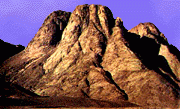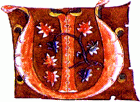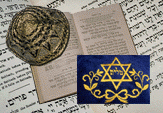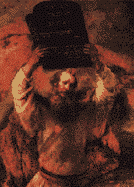1599 Geneva Bible (GNV)
The Geneva Bible: A Cornerstone of English Protestantism A Testament to Reform The 1599 Geneva Bible... Read More
also see: The Purpose & Heart of the Law

Jebel Musa, Arabic for "Mountain of Moses" at the tip of the southern Sinai peninsula has been tradition for many Christian pilgrims since the 4th century AD.
'The Giving of the Law'

hen the Israelites arrived at Mount Sinai, they encamped on the plain that stretches before it. Sinai must have been a tremendous sight. The mountain has been identified by some as the mountain now known as Jebel Musa ( about 6,000 feet high) but this is speculation. This momentous occasion was one of the most important periods in the entire history of the Jewish people for here they received the revelation of God's law and the way of approach to him in the sacred tabernacle.


Jewish Tradition
The Midrash says, "If Torah had been given in the land of Israel, Israel might have said to the nations of the world: 'you have no share in it.' Therefore the Torah was given in the wilderness, ie., in public for all to see; and everyone who wishes to receive it let him come and receive it" [Mekhilta]

They were about to meet their God. The Lord required two days of preparation on the part of the congregation so they would realize who was about to speak to them and that there must be a period of consecration preceding the sound of his voice. They had to be cleansed and all their clothes had to be washed. They even had to abstain form sex with their wives as their hearts and minds were prepared to hear God speak.
Moses drew a boundary at the foot of the mountain beyond which no person or cattle might pass or the penalty would be death. And when the third day came there were visible and audible signs coming from the mountain which caused fear and trembling in the camp.
Exod 19:16-18
Then it came to pass on the third day, in the morning, that there were thunderings and lightnings, and a thick cloud on the mountain; and the sound of the trumpet was very loud, so that all the people who were in the camp trembled. And Moses brought the people out of the camp to meet with God, and they stood at the foot of the mountain. Now Mount Sinai was completely in smoke, because the LORD descended upon it in fire. Its smoke ascended like the smoke of a furnace, and the whole mountain quaked greatly. And when the blast of the trumpet sounded long and became louder and louder, Moses spoke, and God answered him by voice. Then the LORD came down upon Mount Sinai, on the top of the mountain. And the LORD called Moses to the top of the mountain, and Moses went up.
Then God spoke. He spoke not only to his servant Moses as had happened previously, but to the whole congregation (Ex 20:1,19; Deut. 5:4, 22). In place of the trumpet the people heard the very words of the Lord, although they did not see Him. What they heard was the Decalogue or Ten Words, which we refer to now as the Ten Commandments. One after another, in the most awe-inspiring manner, God spoke His Ten Commandments.


Jewish Tradition
Ancient Jewish sages taught that God spoke the Ten Words in the open desert and declared it in the tongue of all nations. This was because the Commandments were not made for Israel alone, but represent a summary of human duties binding upon all men.

Nevertheless, by the time God finished speaking the people were so terrified that they begged Moses to intervene and communicate God's words to them instead. The voice of God made them fear death, and so they asked Moses to go forward into the darkness and to speak with God.

Moses went up into the mountain for 40 days. What Moses then received from God were the laws and the covenant enacted between God and his people. The record of these laws is contained in more than three chapters of the Bible (Ex 20:22-24:4). They cover laws relating to the altar, slaves, murder, civil offences, property rights, social duties, ethics, and many others.


Jewish Tradition
When the Jews left Egypt they were told that 7 weeks later they would be receiving the Law (Heb. Torah) at Sinai. God would lift the mountain over their heads, symbolic of a Jewish wedding canopy (Heb. Chuppah) to convey the imagery that God is truly married to His people. The Jews to this day still count the 49 days from Passover (Pentecost) to Pentecost (Shavuot) and it is called the days of Sephirah. Sephirah comes from two Hebrew words, Sephir (Book) and Yah (The Name of God).

When Moses returned to the congregation he recounted to them all the words of the Lord and the various ordinances and so they all replied:
Exod 24:3 ...."All the words which the LORD has said we will do."
The next day was one of the most important in their history because they legalized a covenant with God. This has been singled out as the day on which "these Hebrew slaves became a nation." They had received a divine revelation and they responded to it by entering into the binding covenant that God offered them.
The Biblical definition for Covenant (Testament) is "a binding agreement between two parties." The Hebrew word for covenant is b'rit and actually means "to cut the covenant." It was cut by the shedding of blood and the walking between the two pieces of flesh (Gen 15). A b'rit could not be broken. When you enter into a covenant you make a solemn promise of love and protection to one another.
A Covenant is a binding agreement between two or more persons and Scripture mentions several made between man and man, such as Jacob and Laban, and David and Jonathan. But the really important covenant was that made between God and man. That kind of covenant was unlike a human agreement in which the two parties approached each other on an equal level. In the divine covenant God, being the only one who could truly fulfill the Covenant, reached down to man as a total act of grace and made the Covenant binding because His Word is a sworn oath.
The fact that God established a formal covenant with the children of Israel immediately after their escape from Egypt was of great significance. They were a weak and demoralized people who had formerly been slaves but God offered to make them into a powerful theocracy (a nation with God as the invisible King). On the day the covenant was legalized, Moses built a stone altar at the foot of the mountain and erected twelve pillars, one for each of the tribes of Israel. Sacrifices were made and half the blood of the animals was applied to the altar of the LORD. This is the first record on a national basis of the slaughtering of animals.
After the sacrifice had been made Moses publicly read the entire book of the Covenant in the hearing of the people. This reading of the whole Law was also required to be performed publicly every seven years at the Feast of Booths. Once again they gladly gave their response saying,
Exod 24:7 And they said, "All that the LORD has said we will do, and be obedient."
God made the Covenant with them knowing full well that they would break their promise. But again the Covenant rested not on their performance but entirely on the integrity of God. Moses then sprinkled the people:
Exod 24:8 And Moses took the blood, sprinkled it on the people, and said, "This is the blood of the covenant which the LORD has made with you according to all these words."
After ascending the mountain Moses remained in the divine presence for forty days while new revelations were being given to him. The record of these forty days alone with God covers seven chapters of the Book of Exodus (25-31). Throughout this period God gave Moses instruction on how men should approach him. And it is during this revelation that we first come across the word 'tabernacle'- a word that was to appear well over four hundred times in the Bible.
Vash'kanti - mikdash - li - v'assoo - b'tocham
"And let them make Me a sanctuary, that I may dwell among them" (may be in them).
But we will get to that in a minute. Next we will look at the rebellion.
The Geneva Bible: A Cornerstone of English Protestantism A Testament to Reform The 1599 Geneva Bible... Read More
The 21st Century King James Version (KJ21): A Modern Approach to a Classic Text A Balancing Act The ... Read More
The American Standard Version (ASV): A Cornerstone of Modern English Bibles A Product of Scholarly R... Read More
The Amplified Bible (AMP): A Rich and Comprehensive Translation The Amplified Bible (AMP) stands out... Read More
The Amplified Bible, Classic Edition (AMPC): A Timeless Treasure The Amplified Bible, Classic Editio... Read More
The Authorized (King James) Version (AKJV): A Timeless Classic The Authorized King James Version (AK... Read More
The BRG Bible: A Colorful Approach to Scripture A Unique Visual Experience The BRG Bible, an acronym... Read More
The Christian Standard Bible (CSB): A Balance of Accuracy and Readability The Christian Standard Bib... Read More
The Common English Bible (CEB): A Translation for Everyone The Common English Bible (CEB) is a conte... Read More
The Complete Jewish Bible (CJB): A Jewish Perspective on Scripture The Complete Jewish Bible (CJB) i... Read More
The Contemporary English Version (CEV): A Bible for Everyone The Contemporary English Version (CEV),... Read More
The Darby Translation: A Literal Approach to Scripture The Darby Translation, often referred to as t... Read More
The Disciples' Literal New Testament (DLNT): A Window into the Apostolic Mind The Disciples’ Literal... Read More
The Douay-Rheims 1899 American Edition (DRA): A Cornerstone of English Catholicism The Douay-Rheims ... Read More
The Easy-to-Read Version (ERV): A Bible for Everyone The Easy-to-Read Version (ERV) is a modern Engl... Read More
The English Standard Version (ESV): A Modern Classic The English Standard Version (ESV) is a contemp... Read More
The English Standard Version Anglicised (ESVUK): A British Accent on Scripture The English Standard ... Read More
The Evangelical Heritage Version (EHV): A Lutheran Perspective The Evangelical Heritage Version (EHV... Read More
The Expanded Bible (EXB): A Study Bible in Text Form The Expanded Bible (EXB) is a unique translatio... Read More
GOD'S WORD Translation (GW): A Modern Approach to Scripture The GOD'S WORD Translation (GW) is a con... Read More
The Good News Translation (GNT): A Bible for Everyone The Good News Translation (GNT), formerly know... Read More
The Holman Christian Standard Bible (HCSB): A Balance of Accuracy and Readability The Holman Christi... Read More
The International Children's Bible (ICB): A Gateway to Faith The International Children's Bible (ICB... Read More
The International Standard Version (ISV): A Modern Approach to Scripture The International Standard ... Read More
The J.B. Phillips New Testament: A Modern Classic The J.B. Phillips New Testament, often referred to... Read More
The Jubilee Bible 2000 (JUB): A Unique Approach to Translation The Jubilee Bible 2000 (JUB) is a dis... Read More
The King James Version (KJV): A Timeless Classic The King James Version (KJV), also known as the Aut... Read More
The Lexham English Bible (LEB): A Transparent Approach to Translation The Lexham English Bible (LEB)... Read More
The Living Bible (TLB): A Paraphrase for Modern Readers The Living Bible (TLB) is a unique rendering... Read More
The Modern English Version (MEV): A Contemporary Take on Tradition The Modern English Version (MEV) ... Read More
The Mounce Reverse Interlinear New Testament: A Bridge to the Greek The Mounce Reverse Interlinear N... Read More
The Names of God Bible (NOG): A Unique Approach to Scripture The Names of God Bible (NOG) is a disti... Read More
The New American Bible, Revised Edition (NABRE): A Cornerstone of English Catholicism The New Americ... Read More
The New American Standard Bible (NASB): A Cornerstone of Literal Translations The New American Stand... Read More
The New American Standard Bible 1995 (NASB1995): A Refined Classic The New American Standard Bible 1... Read More
The New Catholic Bible (NCB): A Modern Translation for a New Generation The New Catholic Bible (NCB)... Read More
The New Century Version (NCV): A Bible for Everyone The New Century Version (NCV) is an English tran... Read More
The New English Translation (NET): A Transparent Approach to Scripture The New English Translation (... Read More
The New International Reader's Version (NIRV): A Bible for Everyone The New International Reader's V... Read More
The New International Version - UK (NIVUK): A British Accent on Scripture The New International Vers... Read More
The New International Version (NIV): A Modern Classic The New International Version (NIV) is one of ... Read More
The New King James Version (NKJV): A Modern Update of a Classic The New King James Version (NKJV) is... Read More
The New Life Version (NLV): A Bible for All The New Life Version (NLV) is a unique English translati... Read More
The New Living Translation (NLT): A Modern Approach to Scripture The New Living Translation (NLT) is... Read More
The New Matthew Bible (NMB): A Reformation Revival The New Matthew Bible (NMB) is a unique project t... Read More
The New Revised Standard Version (NRSV): A Modern Classic The New Revised Standard Version (NRSV) is... Read More
The New Revised Standard Version Catholic Edition (NRSVCE): A Cornerstone of Modern Catholicism The ... Read More
The New Revised Standard Version, Anglicised (NRSVA): A British Accent on Scripture The New Revised ... Read More
The New Revised Standard Version, Anglicised Catholic Edition (NRSVACE): A Bridge Between Tradition ... Read More
The New Testament for Everyone (NTE): A Fresh Perspective The New Testament for Everyone (NTE) is a ... Read More
The Orthodox Jewish Bible (OJB): A Unique Perspective The Orthodox Jewish Bible (OJB) is a distincti... Read More
The Revised Geneva Translation (RGT): A Return to the Roots The Revised Geneva Translation (RGT) is ... Read More
The Revised Standard Version (RSV): A Cornerstone of Modern English Bibles The Revised Standard Vers... Read More
The Revised Standard Version Catholic Edition (RSVCE): A Cornerstone of English Catholicism The Revi... Read More
The Message (MSG): A Contemporary Paraphrase The Message, often abbreviated as MSG, is a contemporar... Read More
The Voice: A Fresh Perspective on Scripture The Voice is a contemporary English translation of the B... Read More
The Tree of Life Version (TLV): A Messianic Jewish Perspective The Tree of Life Version (TLV) is a u... Read More
The World English Bible (WEB): A Modern Update on a Classic The World English Bible (WEB) is a conte... Read More
The Worldwide English (WE) New Testament: A Modern Take on a Classic The Worldwide English (WE) New ... Read More
The Wycliffe Bible: A Cornerstone of English Scripture A Revolutionary Translation The Wycliffe Bibl... Read More
Young's Literal Translation (YLT): A Literal Approach to Scripture Young's Literal Translation (YLT)... Read More
For enthusiastic readers, managing a collection of books can become challenging. An expanding "to be... Read More
Deuteronomy 18 - "And if you say in your heart, 'How shall we know the word which the LORD has not ... Read More
John 14:26 - "But the Counselor, the Holy Spirit, whom the Father will send in my name, he will teac... Read More
(Enlarge) (PDF for Print) Map of the Origin of Nations and Races that were dispersed by God in Gene... Read More
The Journeys of Abraham (Enlarge) (PDF for Print) - Map of Abraham's Journey with Trade Routes Map ... Read More
(Enlarge) (PDF for Print) Map of the Route of the Hebrews from Egypt This map shows the Exodus of t... Read More
Mark 6:52 - For they considered not the miracle of the loaves: for their heart was hardened. God did... Read More
also see:The Encampment of the Children of IsraelThe Children of Israel on the March THE OUTER COURT... Read More
2 Chronicles 36:23 - Thus saith Cyrus king of Persia, All the kingdoms of the earth hath the LORD Go... Read More
All Bible Maps - Complete and growing list of Bible History Online Bible Maps. Old Testament Maps T... Read More
The Bible portrays marriage as a lifelong bond built on love, faith, and commitment, reflecting God'... Read More
Ancient Manners and Customs, Daily Life, Cultures, Bible Lands NINEVEH was the famous capital of an... Read More
Distances From Jerusalem to: Bethany - 2 milesBethlehem - 6 milesBethphage - 1 mileCaesarea - 57 m... Read More
Dagon was the god of the Philistines. This image shows that the idol was represented in the combina... Read More
Map of Israel in the Time of Jesus (Enlarge) (PDF for Print) Map of First Century Israel with Roads... Read More
The Table of Shewbread (Ex 25:23-30) It was also called the Table of the Presence. Now we will pas... Read More
see also:The PriestThe Consecration of the PriestsThe Priestly Garments The Priestly Garments 'The ... Read More
Introduction to the Book of Daniel in the Bible Daniel 6:15-16 - Then these men assembled unto the k... Read More
The Golden Lampstand was hammered from one piece of gold. Exod 25:31-40 "You shall also make a lam... Read More
The Golden Altar of Incense (Ex 30:1-10) The Golden Altar of Incense was 2 cubits tall.It was 1 cub... Read More
Ancient Tax Collector Illustration of a Tax Collector collecting taxes Tax collectors were very des... Read More
also see: Blood Atonement and The Priests The Five Levitical Offerings The Sacrifices The sacrificia... Read More
Genesis 10:32 - These are the families of the sons of Noah, after their generations, in their nation... Read More
Illustration of Jesus Reading from the Book of Isaiah This sketch contains a colored illustration o... Read More
"But the angel said unto him, Fear not, Zacharias: for thy prayer is heard; and thy wife Elisabeth s... Read More
also see: The Encampment of the Children of IsraelThe Children of Israel on the March The brazen a... Read More
In a rapidly evolving world shaped by both timeless values and groundbreaking technology, individual... Read More
Rome, the Eternal City, has stood as a symbol of history, culture, and religion for over two millenn... Read More
Many teachers assign pieces titled “an essay about god in my life.” The title invites calm thought a... Read More
Exploring identity has become part of the digital life. Social media, streaming, and gaming give you... Read More
Unearth the rich tapestry of biblical history with our extensive collection of over 1000 meticulously curated Bible Maps and Images. Enhance your understanding of scripture and embark on a journey through the lands and events of the Bible.
Start Your Journey Today!
